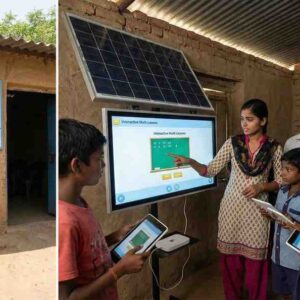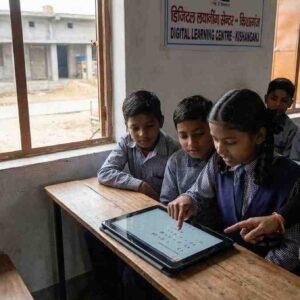A Quiet Transformation in the Learning Landscape
In recent years, India’s education system has undergone a significant transformation driven by EdTech platforms such as BYJU’S, Vedantu, and Unacademy. These platforms have reshaped the way students learn, offering personalized lessons, gamified assessments, and on-demand content. While this silent revolution promises convenience and accessibility, its deeper social consequences on education are now becoming evident.
The Divide Between the “Tech-Savvy” and the “Left-Behind”
- Widening the Digital Divide:
- While urban, middle-class families are reaping the benefits of EdTech, rural and economically weaker sections struggle with poor internet connectivity and the cost of devices.
- Students from low-income households often rely on outdated smartphones or free, less effective resources, leading to a growing educational gap.
- Elite Accessibility:
- Premium EdTech subscriptions offer advanced features like personalized coaching and live classes, creating a two-tier system where affluent families gain an unfair advantage over those who cannot afford these tools.
The Decline of Social Learning
- Loss of Classroom Interaction:
- Traditional schools have long fostered interpersonal skills through group projects, peer discussions, and collaborative problem-solving.
- With EdTech promoting individual, screen-based learning, students miss out on the essential social experiences of a classroom environment.
- Competitive Isolation:
- Gamified leaderboards and constant performance monitoring create a solitary and competitive learning experience, discouraging students from sharing knowledge or collaborating.
- Reduced Teacher-Student Bonding:
- Virtual lessons often replace the emotional connection and mentorship traditionally provided by teachers, leaving students with a sense of detachment.
The Pressure to “Perform” in Silence
- The Invisible Expectations:
- Parents, driven by EdTech’s marketing promises, expect children to excel in multiple disciplines—academics, coding, public speaking, and more.
- This silent pressure can push students into an overburdened routine, where success is defined solely by measurable outcomes.
- Impact on Mental Health:
- With increased screen time, reduced peer interactions, and constant performance tracking, students are experiencing anxiety and burnout at an alarming rate.
- Experts warn that the lack of social support systems can amplify feelings of loneliness among young learners.
Reinforcing Socio-Cultural Norms
- The Reinforcement of Stereotypes:
- EdTech’s curriculum often prioritizes STEM subjects, subtly sidelining arts, humanities, and other creative fields.
- Parents and students may internalize this bias, perpetuating the notion that success is tied exclusively to technical and analytical skills.
- Over-Reliance on Metrics:
- EdTech platforms emphasize progress tracking through scores and analytics, reinforcing a culture where quantitative achievements overshadow creativity and critical thinking.
The Road Ahead: Addressing the Social Consequences
- Bridging the Digital Divide:
- Public-private partnerships can make EdTech more inclusive by providing affordable devices, internet access, and free resources to underserved communities.
- Humanizing Digital Learning:
- Hybrid models that integrate online resources with in-person classes can preserve the social aspects of education while leveraging technology.
- Encouraging Holistic Development:
- Platforms need to expand their offerings to include arts, mental health programs, and extracurricular activities, ensuring a well-rounded education.
- Parental Awareness:
- Educating parents about the limitations of EdTech can help reduce undue pressure on students and encourage a balanced approach to learning.
Conclusion: Balancing Progress with Humanity
EdTech’s silent influence on education is a double-edged sword. While it has democratized access to learning resources and introduced innovative teaching methods, it has also amplified societal divides and diminished the role of interpersonal connections in education.
As India continues to embrace digital learning, stakeholders must address the hidden social consequences to ensure that the future of education is equitable, collaborative, and emotionally fulfilling.
Are EdTech platforms truly reshaping education for the better, or are they creating new challenges that we’re yet to fully comprehend?










